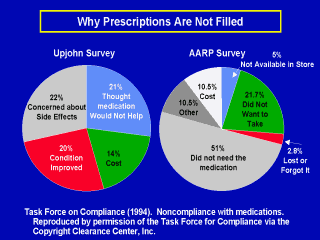 |
There have been two surveys done on why patients don't
initiate prescription treatment. The major reason has to do with the patient's belief
about their treatment regimen. In the AARP survey, 51% of patients basically disagreed
with their health care provider. Another 22% in the same survey said that maybe they
needed the medication but they didn't want to take it. Similarly with the Upjohn survey,
21% of the patients thought that the medication was not actually helpful. A much lower
percentage worried about the occurrence of side effects; these are people who have never
filled a prescription - they have not actually experienced side effects. Either they were
informed about the potential for side effects or believed there were going to be side
effects and decided that would prevent them from following the treatment regimen. Cost is
an issue that comes up frequently among health care providers as a reason that patients
may not be taking medication. But as you can see here, only between 10-14% of patients did
not buy their medications initially because of cost. Colleagues in Great Britain, where
medications are basically free for patients, have indicated that their poor adherence
rates are equivalent to ours, which suggests that, at least internationally, cost is not a
factor. |
